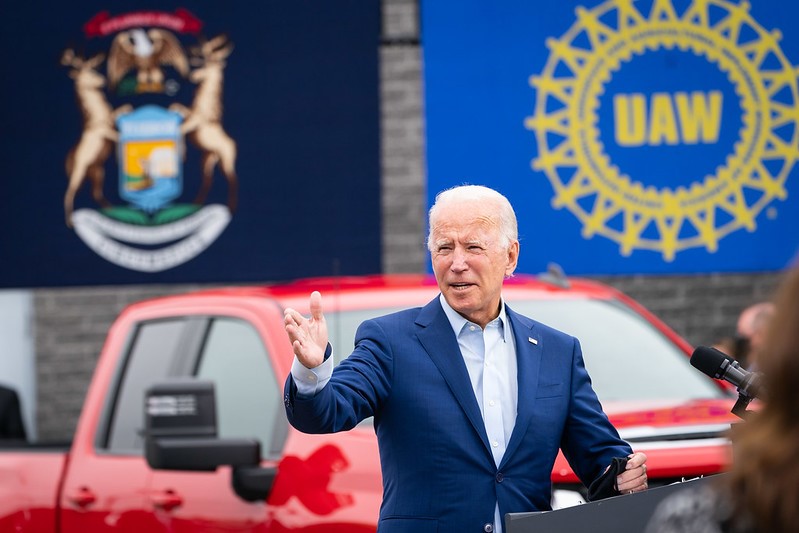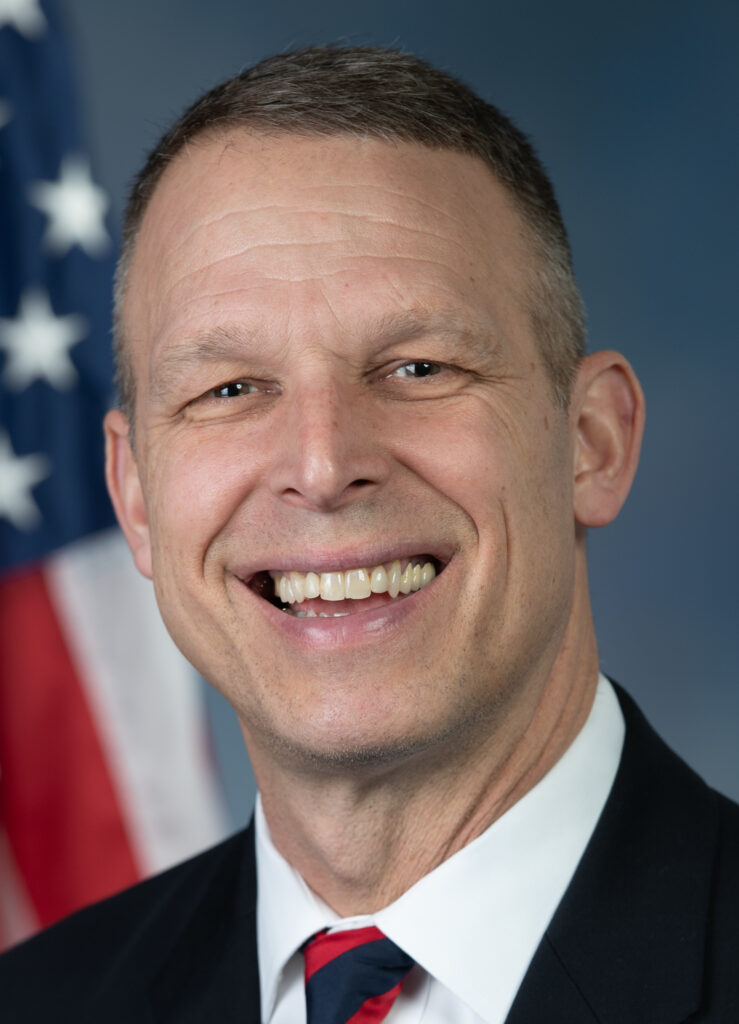Is This Any Way to Run a City’s Schools?
Leaked CTU Proposals Won’t Do Anything to Improve Schools’ Poor Performance

Last August, President Joe Biden’s handpicked appointees to the National Labor Relations Board voted, in Cemex Construction Materials Pacific, to routinize the imposition of union monopoly control over American employees without ever allowing them a secret-ballot vote — or a “vote” of any kind if the NLRB decides certain conditions exist.
Anticipating that this precedent-smashing decision would reap for them a massive windfall in additional coerced union dues and fees extracted from workers, powerful union bosses cheered.
But National Right to Work Committee leaders vowed that the Committee and its members would fight back by supporting all credible efforts to stop the Biden NLRB from abusing its authority in order to expand Big Labor’s extraordinary power over workers.
Last November, Committee legislative staff successfully lobbied for adoption by the U.S. House of Representatives of an appropriations amendment that would block the NLRB from implementing Cemex.
But as this Newsletter edition went to press, Committee officers were battling against ongoing schemes by a coalition of union boss-appeasing GOP politicians and union-label Democrats to remove the pro-secret-ballot amendment before omnibus legislation funding the NLRB is passed by the House.
Right to Work Vice President Greg Mourad commented: “Because they make jacking up the number of U.S. workers who are corralled into a union, rather than protecting each worker’s freedom of choice, their priority, Joe Biden and his appointees prefer so-called ‘card checks’ over secret-ballot elections.
“Experience shows many employees sign pro-union cards or petitions while union organizers are watching them, even though they do not actually favor unionization, then go on to cast votes against the union into a secure ballot box.
“That’s why the Biden NLRB is working to ensure it has the power to override the results of secret-ballot elections routinely if workers vote against unionization, or prevent such votes from even happening if they would be inconvenient for union organizers.”
Under Cemex, the routine NLRB “remedy” for alleged “unfair labor practices” by an employer that may potentially have an impact on workers’ secret ballot votes is to deny workers any opportunity to vote in private against unionization.
In all such cases, cards signed by a bare majority of workers while under union organizers’ close observation are considered sufficient evidence to install the union as employees’ monopoly-bargaining agent.
That’s bad news for independent-minded workers. Just how bad is illustrated by United Autoworkers’ (UAW) union bosses’ 12-year campaign to acquire “exclusive” representation power over employees at the Volkswagen (VW) auto assembly plant in Chattanooga, Tenn.
When UAW operatives began passing out so-called “union authorization” cards to VW’s Volunteer State production employees in 2012, they repeatedly told the employees the cards merely signified an interest in obtaining more information about unionization and the UAW.
But once union organizers had obtained signed cards from a majority of employees, the UAW hierarchy attempted to use them in late 2013 to pressure the company into “voluntarily” recognizing the union as employees’ monopoly bargaining agent, without allowing a secret-ballot vote.
Fortunately, even union-label President Barack Obama’s appointees to the NLRB recognized at that time that Volkswagen did not have to kowtow to this UAW-boss demand, and could instead insist workers get a chance to say “yes” or “no” to the union in private.
That’s exactly what VW did. And in February 2014, workers at the Chattanooga assembly plant voted against the UAW brass.
Five years later, UAW bosses waged an even more sophisticated and lavishly funded PR campaign to foist monopolistic unionism on Chattanooga autoworkers.
They were again defeated at the ballot box.
But current UAW President Shawn Fain, who announced the union’s latest VW Tennessee campaign last fall, has good reason to think things will be different this time.
“Mr. Fain’s basis for optimism in 2024 has little or nothing to do with enhanced UAW success in improving workers’ lives,” noted Mr. Mourad.
“Under his watch, the jobs of UAW-‘represented’ workers in the auto industry are continuing to disappear in droves, just as they did when Mr. Fain’s ethically challenged, and later imprisoned, predecessors were running the union.”
“In early December, for example,” continued Mr. Mourad, “unionized Stellantis announced nearly 3,700 layoffs at its Jeep plants in Detroit and Toledo. A few days later, unionized GM announced it would lay off 1,300 workers in Michigan facilities. Meanwhile, unionized Ford announced it was cutting its 2024 production targets in half at its electric vehicle facility in Dearborn, Mich.
“In sharp contrast, employment at VW’s union-free facility in Right to Work Tennessee has nearly doubled since it opened in 2011.
“In a fair contest, Mr. Fain and his lieutenants would have at least as hard a time as their predecessors in getting the UAW in at this facility, given the union hierarchy’s miserable track record in protecting jobs and spurring job growth.
“But VW workers may well never get a chance to say ‘no’ to the UAW by casting secret ballots, because, as a consequence of the Cemex power grab, there may not be any vote at all.”
Mr. Mourad continued: “Mr. Fain is already paving the way for the Biden NLRB to issue a Cemex-based order that VW recognize the UAW as employees’ monopoly-bargaining agent without a vote.
“The basis for this order would be so-far unsubstantiated ‘unfair labor practice’ [ULP] charges that VW has wrongly curtailed employee speech about unionization in non-work areas of the plant.
“The fact is, whether UAW officials’ ULP charges against VW are grounded or not, they are rich coming from an organization that routinely forces employees to bankroll union speech with money siphoned out of their paychecks, regardless of whether the employees agree with the speech or not!”

The National Right to Work Committee and its members are determined to stop Shawn Fain and other union bigwigs from exploiting Cemex to expand their coerced ranks and dues revenue dramatically, without ever having to court workers’ electoral support.
That’s why, late last year, Right to Work legislative staff worked with House allies like Reps. Bob Good (R-Va.) and Scott Perry (R-Pa.) as they drafted an amendment to the FY 2024 Labor/HHS/Education Appropriations Bill (H.R.5894) that would block the NLRB from enforcing Cemex.
Pro-forced-unionism House Democrats who were apparently reluctant to go on the record in opposition to secret-ballot votes for workers allowed this amendment to be adopted by the chamber in a voice vote.
“The adoption by the full House of Rep. Perry’s prohibition on the NLRB’s ‘use of funds to implement or enforce’ Cemex as part of H.R.5894 was a significant step forward,” said Mr. Mourad.
“Unfortunately, the House adjourned in 2023 without ever passing H.R.5894 itself, and there is a great danger that the substitute appropriations legislation that emerges this winter will drop the ban on enforcing Cemex, largely because a handful of Big Labor-appeasing House Republicans don’t want it.
“And the fact is, as long as Big Labor controls the White House and the Senate, it will be an uphill battle to get Congress to use its appropriations power to rein in Joe Biden’s radically pro-forcedunionism NLRB appointees.
“But this is a battle Right to Work supporters must fight.
“The Committee and its members are doing everything we can to see that the prohibition on Cemex enforcement remains in H.R.5894 and in any Labor/HHS/Education appropriations legislation that emerges to replace it.”
This article was originally published in our monthly newsletter. Go here to access previous newsletter posts.
To support our cause and help end forced unionism, go here to donate.

Leaked CTU Proposals Won’t Do Anything to Improve Schools’ Poor Performance

Wherever Big Labor wields the power to collect forced union dues, union bosses funnel a large share of the confiscated money into efforts to elect and reelect business-bashing politicians. Employment growth tends to lag as a consequence.

Members Insist They Keep Pro-Right to Work Campaign Promises